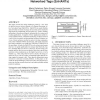Free Online Productivity Tools
i2Speak
i2Symbol
i2OCR
iTex2Img
iWeb2Print
iWeb2Shot
i2Type
iPdf2Split
iPdf2Merge
i2Bopomofo
i2Arabic
i2Style
i2Image
i2PDF
iLatex2Rtf
Sci2ools
MOBICOM
2009
ACM
2009
ACM
Challenge: ultra-low-power energy-harvesting active networked tags (EnHANTs)
This paper presents the design challenges posed by a new class of ultra-low-power devices referred to as Energy-Harvesting Active Networked Tags (EnHANTs). EnHANTs are small, flexible, and self-reliant (in terms of energy) devices that can be attached to objects that are traditionally not networked (e.g., books, clothing, and produce), thereby providing the infrastructure for various novel tracking applications. Examples of these applications include locating misplaced items, continuous monitoring of objects (items in a store, boxes in transit), and determining locations of disaster survivors. Recent advances in ultra-low-power wireless communications, ultra-wideband (UWB) circuit design, and organic electronic harvesting techniques will enable the realization of EnHANTs in the near future. In order for EnHANTs to rely on harvested energy, they have to spend significantly less energy than Bluetooth, Zigbee, and IEEE 802.15.4a devices. Moreover, the harvesting components and the ultr...
Communications | MOBICOM 2009 | Ultra-low-power Devices | Ultra-low-power Physical Layer | Ultra-low-power Wireless Communications |
| Added | 28 May 2010 |
| Updated | 28 May 2010 |
| Type | Conference |
| Year | 2009 |
| Where | MOBICOM |
| Authors | Maria Gorlatova, Peter R. Kinget, Ioannis Kymissis, Dan Rubenstein, Xiaodong Wang, Gil Zussman |
Comments (0)

